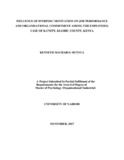| dc.contributor.author | Munyua, Kenneth M. | |
| dc.date.accessioned | 2017-12-07T08:24:23Z | |
| dc.date.available | 2017-12-07T08:24:23Z | |
| dc.date.issued | 2017-11 | |
| dc.identifier.uri | http://hdl.handle.net/11295/101671 | |
| dc.description | A Project Submitted In Partial Fulfilment of the Requirements for the Award of Degree of Master of Psychology (Organisational/ Industrial) | en_US |
| dc.description.abstract | Motivation is a rare commodity and organisational leaders grapple with this challenge as no one knows with certainty what really motivates employees and once motivated how it could be sustained to bring out optimum job performance and organisational belongingness in employees towards the realisation of organisation’s objectives as the belief in most organisations history is that money is the most available motivator yet studies are proving otherwise: money is not the best motivator. The study took into consideration that globally organisations are cutting down on costs owing to competition and converting some of the finances to other programs and incentives to boost their staff morale and enhance productivity. The purpose of the research project was to find out the relationship between intrinsic motivation and job performance and organisational commitment among the employees with reference to K-Unity Savings and Credit Cooperative Society Ltd. Theoretical framework for the study was based on Herzberg’s two-factor theory (Teck-Hong & Waheed, 2011), Robbins and Judge (2013), and Lawrence and Nohria (2002) four-drive theory. The study adopted a quantitative and descriptive research design. A structured study instrument was used to collect the relevant data that adopted content, face, construct and concurrent validity while instrument reliability was addressed through a pilot survey to pre-test the questionnaire. Simple random sampling method was used to get the appropriate population size of 187 representing 93.5% of the total population while correlational and analysis of variance (NOVA) was used to find the relationship between the study’s independent and dependent variable measures based on the study’s objectives and hypothesis. The findings established that intrinsic motivation and rewards contribute significantly to employees’ job performance (p- value of 0.015 < 0.05 and R square value of 0.032) and organisational commitment (correlation of 0.202 (20.2% and p-value of 0.006 < 0.05). The study concludes that by utilising and investing in non-financial rewards, employees improve their job performance and develop organisational citizenship behaviour displayed by their commitment to the organization. The study therefore recommends that organizations invest in non-financial rewards and incentives and more studies been done to determine the role that could be played by job-related attitudes in enhancing employees’ job performance and organizational commitment. | en_US |
| dc.language.iso | en | en_US |
| dc.publisher | University of Nairobi | en_US |
| dc.rights | Attribution-NonCommercial-NoDerivs 3.0 United States | * |
| dc.rights.uri | http://creativecommons.org/licenses/by-nc-nd/3.0/us/ | * |
| dc.title | Influence of Intrinsic Motivation on Job Performance and Organisational Commitment Among the Employees: Case of K-unity, Kiambu County, Kenya | en_US |
| dc.type | Thesis | en_US |



